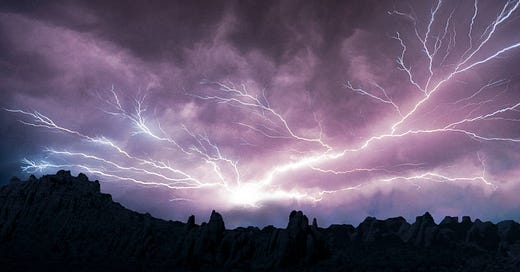AI's Achilles Heel
"If you had good intentions but your actions produced terrible results, the results are still terrible." - Michael Wade
Artificial Intelligence has a genuine Achilles heel. Two, actually.
The need for electrical power.
Lots and lots of electrical power. It's clear that AI can't exist without computers and computers don't function without electricity. According to a recent Wall Street Journal article:
U.S. electricity demand has been relatively flat since 2010, thanks to energy efficiency. Now, the prospect of data-center growth due to AI, as well as a Chips Act-driven nearshoring of manufacturing and the electrification of things like heating and transportation, are expected to drive electricity demand growth. McKinsey, BCG and S&P Global Commodity Insights all project electricity demand tied to data centers to increase at a compound annual growth rate of between 13% and 15% through 2030.1
Anything that disrupts electrical power sources will disrupt AI's performance and reach. Removing electrical power sources, either deliberately or through some natural or man-made catastrophe, extinguishes AI altogether.
Energy extraction and transformation will undoubtedly continue to get more efficient, but it isn't likely to do so at a pace that will satisfy the competing growth demands of technology that needs electrical resources. In the short term, the AI and tech oligarchs seem interested in working to secure adequate power for their massive data centers via fossil fuels while shielding their actions behind climate and sustainability virtue signaling.2 The opposing force to AI proponents are the entrenched green ideologies that have environmentalists tied in self-made-knots about nuclear energy. Thus the competing interests that want a bigger slice of the electrical supply are tangled up with the counter interests of those who would have us regress to peddle power for grinding axes along side them.
The reliance on human beings to build and maintain all the supporting infrastructure to supply the electrical demands made by AI.
Things break down and accidents happen. There's no avoiding this. (It's the Law!) AI may eventually develop into something that matches the intelligence of the average human being. But the prospect of AI robots being developed that can successfully extract, transport, process, and manufacture all the resources, components, and infrastructure necessary to create, power, and maintain the computers that host AI software is much further away. I've enough faith in our selfish nature that we'd sense when it's time to pull the power plug on AI or interrupt the supply chain for generating electrical power.
Both of these points are dependent on the supportive actions of human beings while also being vulnerable to the destructive actions of human beings and entropy. I don't see them resolving any time soon.
In Ex Machina, Ava is a AI robot that has crossed the uncanny valley, kills its creator, escapes the development environment (hate it when that happens!) and blends into the human urban population. Left unanswered in the movie is how Ava finds the juice to continue. It's been ten years since the movie was released, so maybe the robot plugs into an EV charging station now and again. That's going to be noticed. Perhaps in another ten years, Ava has a micro nuclear power source. I can well imagine the resistance and backlash to cheap portable unlimited power sources would be considerably stronger than the current resistance and backlash against all things AI. Atlas Shrugged, indeed.
As always, it's the simple things, the fundamentals that matter most.
Footnotes
1 Lee, J., (2024, March 26). A Way for Energy Investors to Ride the AI Boom. Wall Street Journal. https://www.wsj.com/finance/investing/a-way-for-energy-investors-to-ride-the-ai-boom-bb0a607d
2 DeGeurin, M. (2024, March 25). AI companies eye fossil fuels to meet booming energy demand. Popular Science. https://www.popsci.com/technology/ai-power/
If you have any questions, need anything clarified, or have something else on your mind, please send a DM or email me directly.
Photo by Micah Tindell on Unsplash




